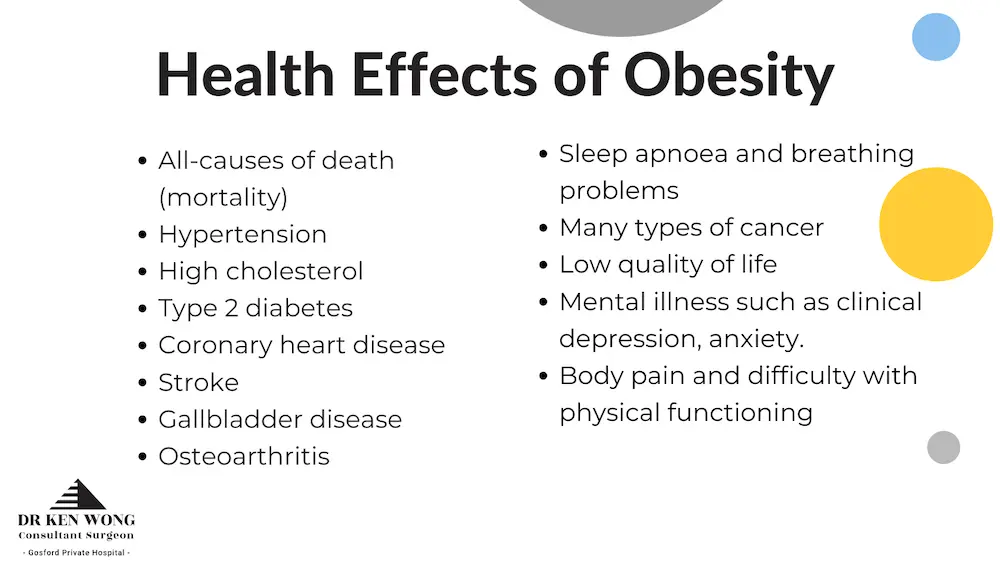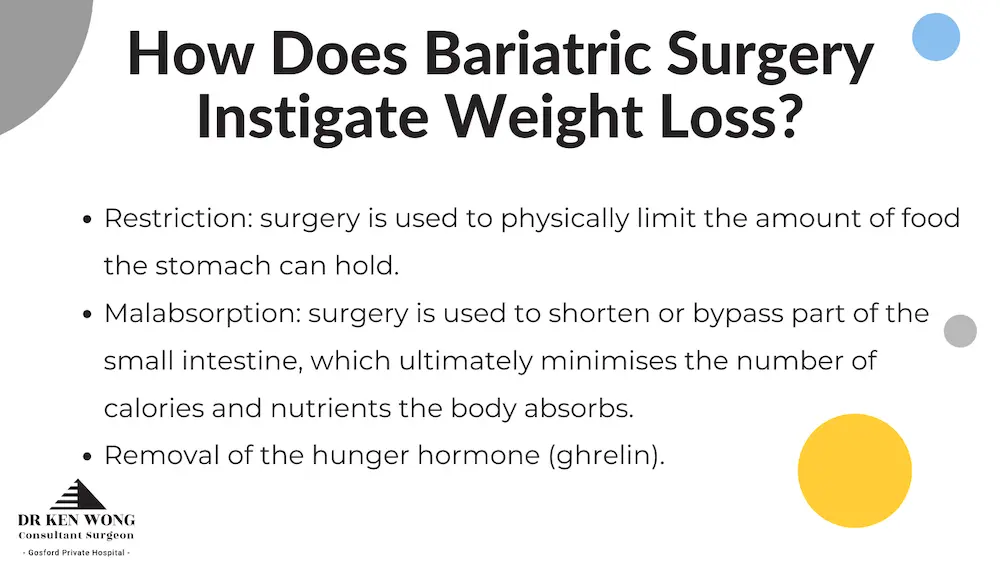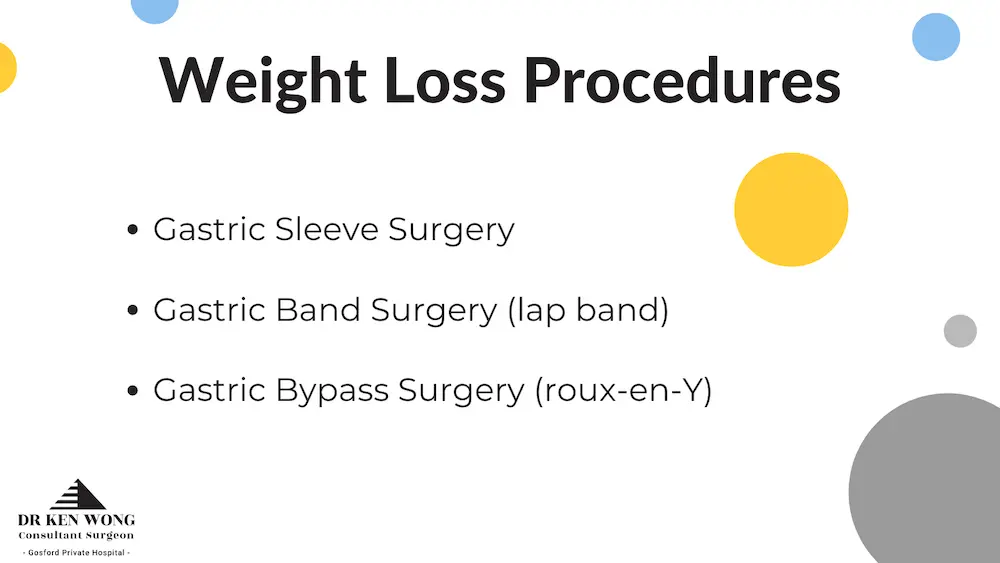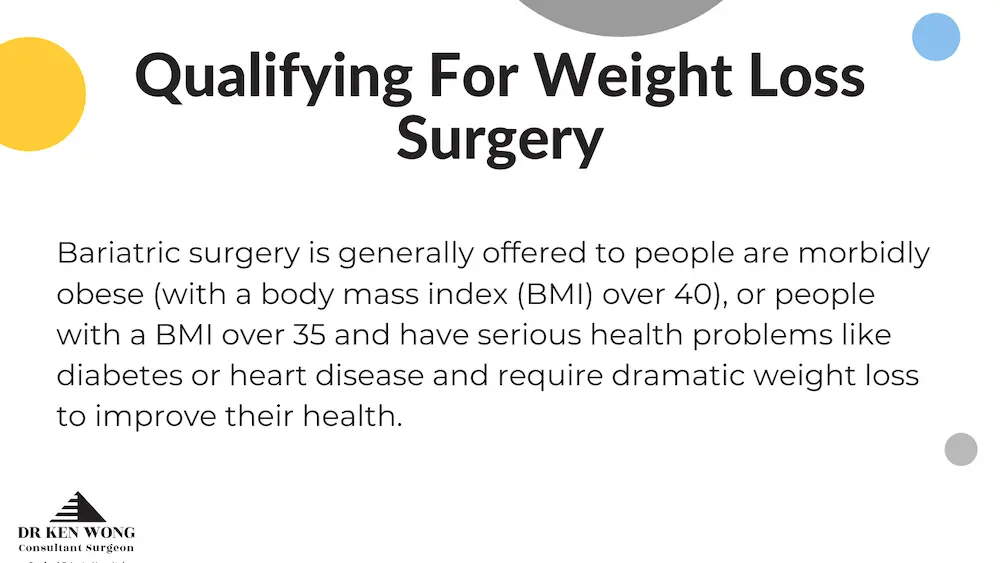Weight loss surgery is an effective, long-term solution to lose weight and keep it off in the long term. For many, weight loss surgery provides an opportunity to regain control over health and dramatically transform lifestyles for the better.
The AIHW report, Weight loss surgery in Australia 2015-15, revealed that admissions to hospital for weight loss surgery grew to 27,713 in 2014-15, up from about 9,300 in 2005-06. In 2019, additional weight loss statistics from the ABS' National Health Survey showed that two-thirds (67.0%) of Australian adults were iverweight or obese.
Obesity is a severe health condition that when left untreated, leaves people at risk of heart disease, type 2 diabetes, certain types of cancer, asthma, obstructive sleep apnoea and more. With such a large percentage of the population facing obesity, those facing clinically severe obesity are turning to weight loss surgery to get their health back on track.

With more people accessing clinical treatment for obesity, greater education is required on the subject of weight loss surgery and the available options. Many consider weight loss surgery to be a quick-fix to dramatically lose excess weight and shrink the size of their stomach. However, for weight loss surgery to be successful, the procedure requires a life-long commitment to a healthy and balanced lifestyle.
This article will aim to break down some of the many frequently asked questions we receive at Central Coast Surgery as a highly qualified and advanced weight loss clinic.
Weight Loss Surgery Australia: What’s Involved?
Weight loss surgery Australia falls into the category of bariatric surgery. Bariatric surgery refers to procedures that affect your stomach and how your body digests and consumes food. While there are a few different routes of weight loss surgery, the procedures are all generally designed to make the stomach smaller, which causes the patient to feel full after eating just a small amount of food. The patient eats less food, absorbs fewer calories, and changes their eating behaviours entirely after weight loss surgery.
Bariatric surgery is often the most dramatic and effective way to lose excess weight and keep it off in the long term. Weight loss surgery can help patients lose 50% or more of excess body weight, generally over two years. Often referred to as weight loss or obesity surgery, weight loss surgery can help to treat conditions that are related to obesity, such as type 2 diabetes and sleep apnoea. Other benefits of the operation will generally include improved self-esteem, mood, and quality of life.
There are three main ways that weight loss surgery can work and contribute to weight loss:
- Restriction: Wherein surgery is used to physically limit the amount of food the stomach can hold, filling the patient up earlier, and restricting the number of calories that can be consumed.
- Malabsorption: Wherein surgery is used to shorten or bypass part of the small intestine, which ultimately minimises the number of calories and nutrients the body absorbs.
- The third way weight loss surgery may contribute to weight loss is the alteration of the production and release of the hormone that is directly related to hunger (ghrelin), resulting in reduced appetite and increased feelings of fullness.

Weight Loss Surgery Options
As for the actual bariatric procedures, here at Central Coast Surgery, we offer the three main types of weight loss surgery Australia:
- Gastric Sleeve Surgery
- Gastric Band Surgery
- Gastric Bypass Surgery
Gastric Sleeve Surgery
A gastric sleeve is a surgical weight loss procedure that permanently reduces the size of the stomach by two-thirds. The procedure is performed laparoscopically, removing a large portion of the stomach and stapling the remainder to form a smaller, pouch or sleeve of stomach. This newer, smaller stomach dramatically reduces the amount of food that the patient can consume, while also removing the ghrelin hormone that produces the feeling of hunger. Gastric sleeve surgery is irreversible and will generally be offered to patients that do not qualify for gastric bypass surgery.
Gastric Band Surgery
Gastric band surgery, or lap band surgery, is a surgical weight loss procedure that involves placing an inflatable, adjustable band around the stomach. The band works to divide the stomach into two portions, with a small upper portion and a large lower portion. There is a small outlet in-between that slows down the emptying process into the gut and the intestines, allowing the patient to experience an earlier feeling of fullness and increased satisfied with smaller amounts of food. The lap band is adjustable and can be modified by inflating or deflating the tension with saline solution – the surgeon can easily adjust the lap band for the patient using a fine needle through the skin.
Gastric Bypass Surgery
Gastric bypass surgery is a major surgical weight loss procedure that reconstructs the digestive system. During the gastric bypass procedure, a small stomach pouch is created through stapling and is the only part of the stomach that will receive food going forward. This significantly limits the amount of food and drink that a patient can consume at one time.
The small intestine is then cut a short distance below the main stomach pouch and is connected to the new pouch. Food will move directly from the pouch into this part of the intestine. The main part of the stomach continues to create digestive juices, and the intestine that is still attached is reattached further down. This allows the digestive juices to move to the small intestine. As food now bypasses a portion of the small intestine, fewer nutrients and calories are absorbed; further aiding the weight loss process.

Is Weight Loss Surgery Safe?
All weight-loss surgeries are generally very safe. Given that they are almost always completed laparoscopically, bariatric surgery is among the safest surgical procedures in Australia. When compared to the risks of living with morbid obesity – diabetes, sleep apnoea, hypertension, heart disease, asthma, and the increased likelihood of premature death – the risks of weight loss surgery are minimal. However, depending on the procedure, there are always risks associated with major abdominal surgery.
Should I Have Weight Loss Surgery?
Bariatric surgery is generally offered to people are morbidly obese (with a body mass index (BMI) over 40), or people with a BMI over 35 and have serious health problems like diabetes or heart disease and require dramatic weight loss to improve their health.
Patients who consider bariatric surgery should have already seriously tried weight loss alternatives first. The first step to getting your weight on track is to change food consumption and exercise behaviours. Weight loss surgery is generally considered only after dietary and alternative medical treatments have failed. There are typically several steps that people should try before they consider a dramatic procedure such as weight loss surgery.
If you’re considering weight loss surgery, you should be motivated to lose weight, realistic about your expectations with the procedure, and willing to commit to an entire change of lifestyle.
What Are the Risks of Weight Loss Surgery?
Weight loss surgery and bariatric procedures can be an enormous life-changing event in one’s life. However, people should not go into weight loss surgery without being aware of the associated risks. The risks associated with bariatric surgery include:
- Excessive bleeding
- Infection
- Negative reactions to anaesthesia
- Gastric leaking
- Obstructed bowels
- Gallstones
- Stomach ulcers
- Malnutrition
As is the way with any major surgery, there will always be the risk of complication. It is best to have a thorough consultation with your physician before you are approved for weight loss surgery; to weigh up the benefits in comparison to the risks involved for you personally.
What’s the Best Weight Loss Surgery for Me?
The type of weight loss surgery that may be best for you depends on several factors, including:
- Age
- How much excess weight you need to lose
- How quickly you need to lose weight
- Your medical history
Different weight loss procedures may be more appropriate for different patients. Gastric band procedures generally entail a slower process, wherein the weight loss is less dramatic than gastric bypass surgery. If you have a very high BMI, a malabsorptive procedure is more likely to provide greater weight loss than a restrictive procedure alone. Furthermore, gastric sleeve surgery is often recommended to those who do not qualify for other weight loss procedures. It will all depend on your circumstantial situation, your surgeon, and the medical conditions you face.
Does Medicare Cover Weight Loss Surgery Australia?
Medicare considers weight loss surgery as a genuine health intervention, and therefore, will partially cover the costs involved in bariatric surgery. However, Medicare will only cover patients that are classed as clinically morbidly obese, under the MBS guidelines. Medicare defines a morbidly obese person as anyone with a body mass index of 40+ or a body mass index of 35+ accompanied by diabetes, heart disease or cancer.
Weight loss surgery Australia is not fully covered under Medicare, and there will be some out of pocket expenses that are managed by the patient or private health insurance fund.

Does My Insurance Cover Weight Loss Surgery?
Whether or not your private health insurance covers weight loss surgery will depend on your provider and your policy. Most health insurance providers will offer coverage on weight loss surgery, but you will need to ensure it is part of your policy. If you are covered by private health insurance, this will often cut the fees down by about two-thirds, potentially covering the accommodation, theatre fees, anaesthesia and physician’s fees.
Does Medicare Cover Weight Loss Revision Surgery?
Weight loss revision surgery may be required if the patient has gained weight after the bariatric surgery. There are a number of potential causes for weight gain after bariatric surgery; however, the most common cause can usually be attributed to lifestyle factors.
Certain recipients who satisfy Medicare’s requirements for coverage of bariatric surgeries may also be covered for a revision with their Medicare benefits. To be eligible for coverage, medical records need to have shown that the patient was initially eligible and had been morbidly obese for five years or more. Additionally, documentation that conventional weight loss methods have failed is also required.
Does Medicare Pay for Skin Removal After Weight Loss Surgery?
For many patients, they may experience extreme excess skin following their dramatic weight loss from bariatric surgery. The removal of excess skin is referred to as abdominoplasty; a form of cosmetic surgery that alters the shape of the abdomen.
Medicare generally does not cover the costs of cosmetic surgery, and often private health insurance does not either. However, if the abdominoplasty is completed for reconstructive purposes, Medicare may intervene and cover some of the costs. Medicare will allow for a modest rebate if you satisfy the weight loss criteria after your bariatric procedure. This includes demonstrating:
- That you have had significant weight loss, defined as 5 BMI points or more
- The level of excess skin is interfering with daily living
- Use of non-surgical treatments for skin irritation caused by excess skin has failed to work
If you are considering skin removal after weight loss surgery, it is best to consult your bariatric physician for your Medicare rebate options.
How Much Is Weight Loss Surgery in Australia?
If you’re still wondering how much does it cost to have weight loss surgery, it all depends on whether or not you have private health insurance or not.
Insured patients:
For weight loss surgery at Central Coast, insured patients will be out of pocket around $3,500. This fee will cover everything from the surgery, follow-ups, dietician, bariatric physician and psychologist consultations.
There may be extra costs related to the anaesthetist, surgical assistant, nutritional supplements and pathology services. These costs are not associated with the Central Coast Surgery weight loss clinic.
For non-insured patients:
For weight loss surgery at Central Coast, non-insured patients will be out of pocket approximately $20,000. This includes all fees, associated with the clinic and not.
If you’d like to learn more about weight loss surgery Australia, the costs of weight loss surgery, and your procedure options, get in touch with our team today. Central Coast Surgery are at the forefront of bariatric surgery servicing patients in the Central Coast, right down to Sydney.
